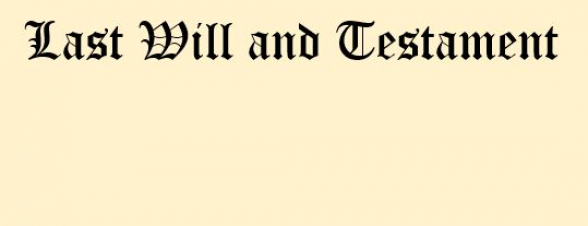National Estate Planning Awareness Week
In 2008, the House of Representatives designated the third week in October as National Estate Planning Awareness Week. The House of Representatives noted that “over 120,000,000 Americans do not have up-to-date estate plans to protect themselves or their families in the event of sickness, accidents, or untimely death.” Recent polls show that a significant percentage of Americans still do not have up-to-date estate plans. Excuses for not having estate plans range from age, to cost, to the time it takes, to not having enough money to warrant the effort involved. Each of these is a poor excuse for not formulating an estate plan. Below is a discussion of basic estate planning documents and why they are necessary.
Advance Health-Care Directive, also known as a Living Will
This document gives directions to your health-care provider regarding your care and/or appoints an agent to make decisions for you should you no longer be able to make decisions for yourself because of illness or incapacity. A standard form that you can easily complete yourself is available from most health-care providers. The form will prompt you to designate “agents” – the folks that you authorize to act on your behalf – and indicate the level of authority they will be given. The form asks you to nominate a guardian should a court need to appoint one for you. If you do not want to name an agent or nominate a guardian, you will need to indicate your wishes concerning when to stop treatment, when to stop artificial nutrition and hydration, and your preferences for pain management. The form then prompts you to indicate your wishes regarding organ and tissue donation. Finally, it allows you to give special instructions about your funeral or burial arrangements. Without an Advance Health-Care Directive, Maine law provide a list of eligible classes of surrogates to act on your behalf and ranks them by priority. This may result in people who you do not wish to act on your behalf being appointed to do so!
Example: Mr. Wilson is incapacitated and in terminal condition. His spouse passed some years ago. They had two children together, Robin and Giles. Giles believes that his father would have wanted the doctors to stop artificial nutrition and hydration. Robin believes her father would want the doctors to continue providing life support. The health-care provider must now refer Robin and Giles to a neutral third party or a court for assistance in resolving the dispute or seek a different class of relatives to make the decision.
Power of Attorney
A power of attorney, often abbreviated as POA, is similar to the Advance Health-Care directive in that it delegates power to another person (your agent) to act on your behalf while you are still alive. The power to act may be broad or narrow and may begin immediately or be triggered by some event. The most compelling reason for a power of attorney is protect yourself and your loved ones in the case of your incapacity. If you become incapacitated, your loved ones may be forced to petition the court for a finding of incapacity and appointment of a guardian. This is an expense and a delay that could easily be avoided with a POA. By creating a POA, you have the ability to control who is handling your affairs and provide them with instructions in the document.
Example: Mrs. Thatcher has been married to Mr. Thatcher for 40 years. Both are retired. Their primary source of income is an investment management account in Mrs. Thatcher’s name only. She becomes incapacitated without a POA. Mr. Thatcher must go to the court and seek appointment of a guardian for his wife to withdraw money from the account to provide for her care.
Last Will and Testament
Unlike the Advance Health-Care Directive and Power of Attorney, which give instructions to others while you are alive and unable to act, a Last Will and Testament (Will) gives instructions to others after your passing. Having a Will enables you to, among other things, decide who receives your property after your death, nominate a guardian for your minor children, name a conservator to manage the property of your minor children, name a personal representative to administer your estate, create a trust to protect any property being left to minors or incapacitated persons, and so on. If you do not have a Will, your property will pass through intestacy laws. These laws may result in your property passing to others in a way that is contrary to your wishes.
Example: John has been married to Norma for 20 years. John is the primary bread winner in the family. He and Norma have two children, James and Elizabeth who are 19 and 21 years old respectively. John dies unexpectedly and without a Will. His estate is worth $450,000. According to Maine’s intestacy laws, Norma will receive the first $50,000 and one half of the remainder for a total of $250,000. James and Elizabeth will each receive $100,000. This isn’t the outcome that we typically see most couples choose. Had there been a Will in place, the proceeds of John’s estate would likely have gone to Norma, who may or may not have chosen to distribute inheritance to their two children depending on their specific circumstances.

